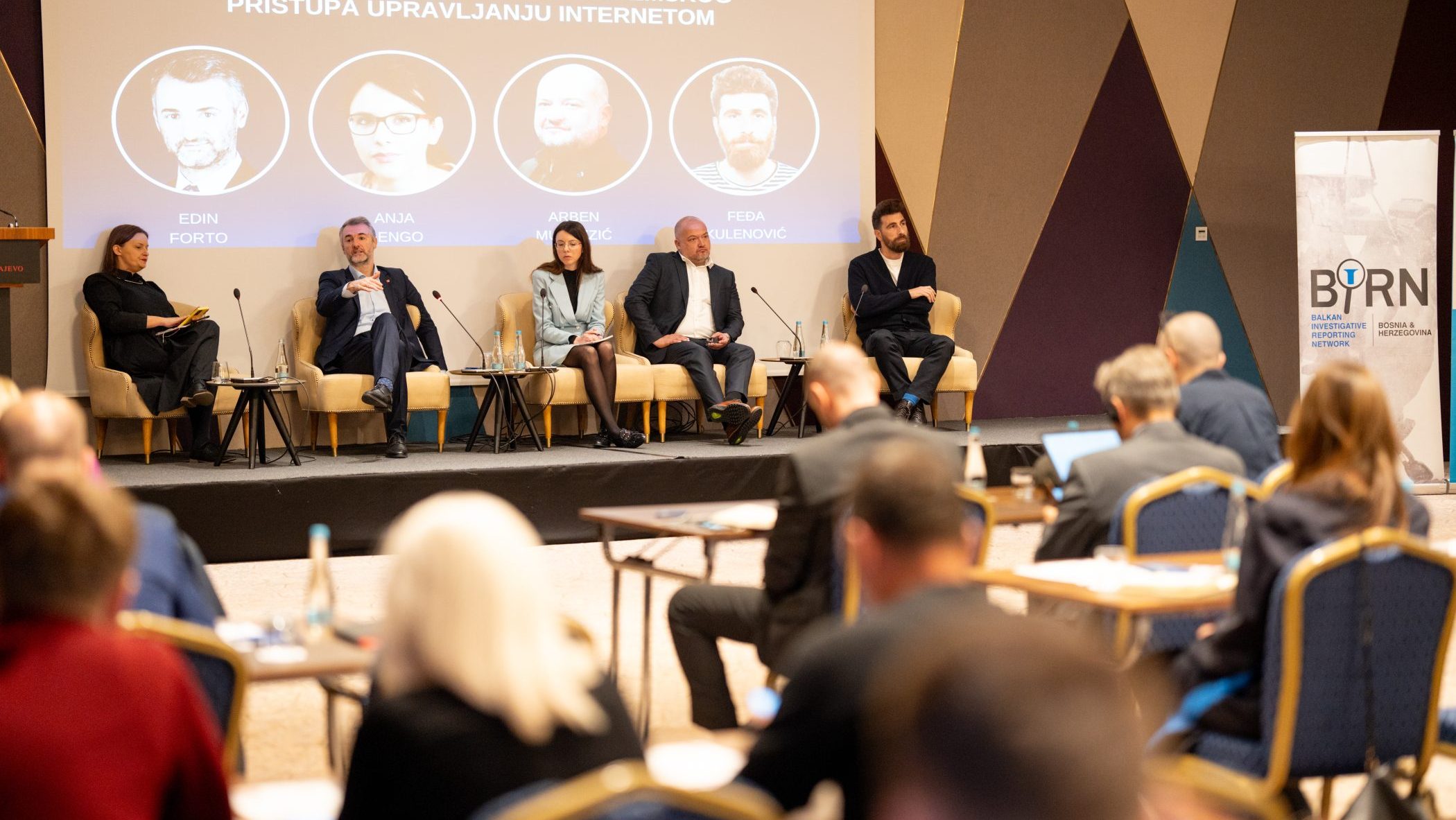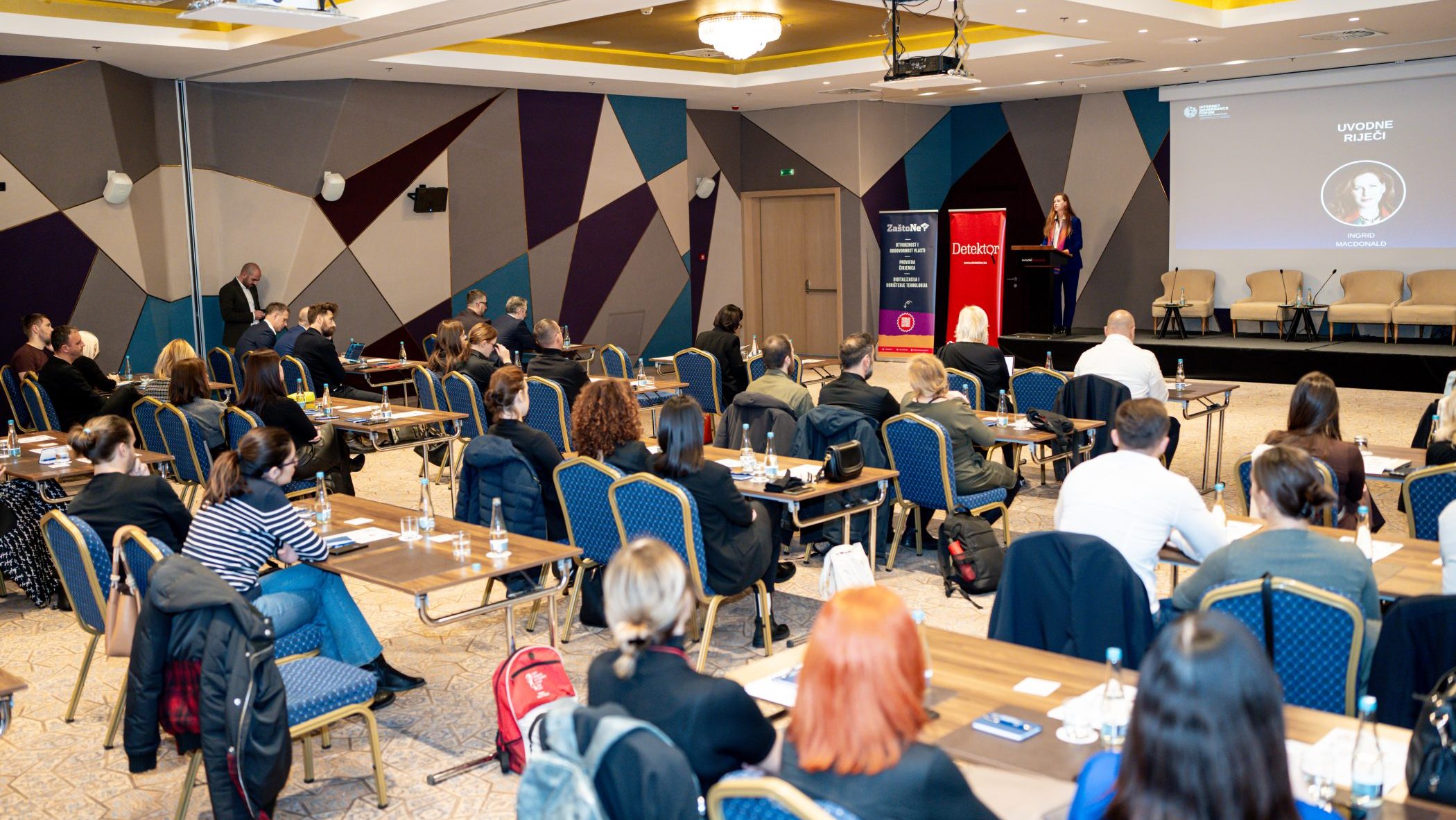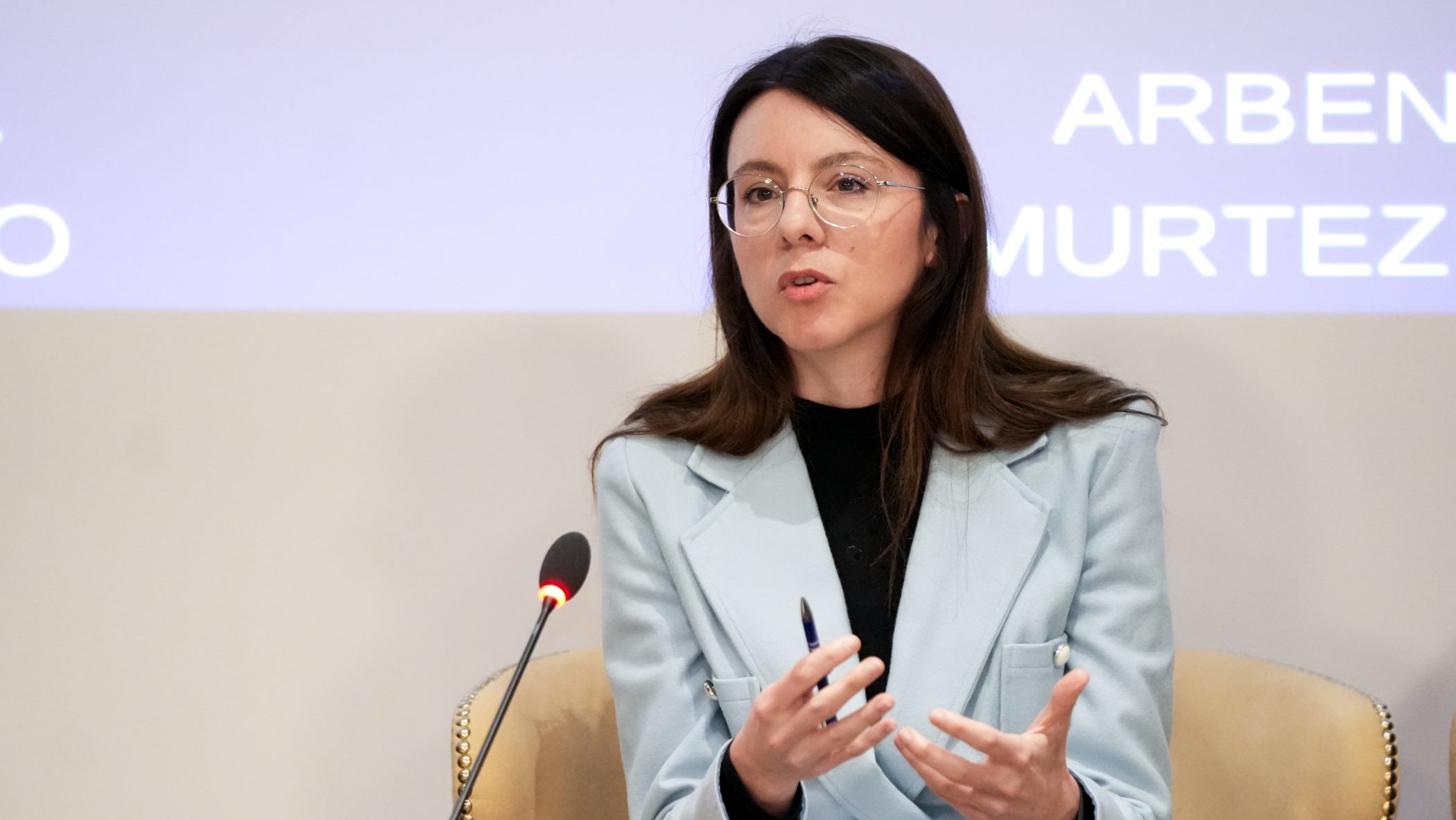This post is also available in: Bosnian
 Razgovor o izazovima BiH u osiguranju sistemskog pristupa upravljanju internetom. Foto: Detektor
Razgovor o izazovima BiH u osiguranju sistemskog pristupa upravljanju internetom. Foto: Detektor
In her introductory remarks at the IGF, Ingrid MacDonald, United Nations Resident Coordinator in BiH, stressed the importance of the country joining the global discussion on internet governance as soon as possible, especially given that these efforts have been initiated by civil society in BiH.
MacDonald warned of the daily risks associated with the digital space, emphasizing the need to recognize these dangers and respond to them adequately. She pointed to disinformation as a serious concern that is threatening human rights and undermining democratic processes worldwide. As examples, she highlighted the targeting of medical professionals during the coronavirus pandemic and the unprecedented levels of misinformation observed during the war in Gaza.
She especially emphasized the need to protect human rights and bolster general security in the digital space, with particular attention to children and other vulnerable groups.
“The protection of children is something that is crucial for BiH as well, to ensure there is safety in the online space and that sexual predators, as well as all others who exploit children and their video content, are stopped,” MacDonald said.
She also referenced the Global Digital Compact, an international framework for the governance of digital technologies and artificial intelligence, which offers unprecedented solutions for safeguarding human rights worldwide.
Dunja Mijatovic, a human rights and new technologies expert, said that the internet is now connecting people like never before, necessitating new approaches to managing this tool effectively.
She emphasized that communities around the world are facing unique challenges in the digital world today, and that only a joint effort from citizens, institutions, and the private sector can contribute to regulating this area.
This is especially crucial, she added, in BiH, where regulation is lacking and the authorities are not moving towards addressing this important issue. For her, the media thus has a critical role in connecting all societal groups in this process.
“In the context of internet governance, the media has three key roles: to promote responsibility, media literacy, and to clarify local and global perspectives. Although they are often not included in the discussion on governance, it is important for this to change in BiH, but also globally,” Mijatovic added.
 Ingrid MacDonald. Photo: Detektor
Ingrid MacDonald. Photo: Detektor
Denis Dzidic, Executive Director of the Balkan Investigative Reporting Network (BIRN) in BiH, and Darko Brkan, Executive Director of the organization ‘Why Not’, also stressed the growing importance of internet governance issues. Yet, in BiH, these discussions do not include the whole community, which must change in order for the country to align with global trends and regulate its information space and digital services.
At the first IGF panel, Edin Forto, State Minister of Transport and Communications, said that there was no consensus in BiH on how to govern the internet in any sector, and that building this consensus is the first step that must be taken.
In terms of security, he recalled a cyberattack on the BiH Parliament, when the data was preserved purely by chance, emphasizing that the absence of cybersecurity protocols leaves the entire society vulnerable to threats.
“We could have one serious cyberattack that freezes all processes in our society, and we wouldn’t know how to respond to it,” Forto warned.While acknowledging the revival of efforts to establish a Computer Incident Response Team (CERT) in Bosnian institutions, he also noted that this process had stalled—an apt illustration of the country’s vulnerability to risk.
To resolve these issues, he advocates adopting a new law on electronic communications in accordance with European Union legislation, as well as implementing measures to ensure transparency in media ownership, as the media must be a key partner in designing legal and strategic frameworks for internet governance.
 Anja Gengo. Photo: Detektor
Anja Gengo. Photo: Detektor
Anja Gengo, Program Expert at the UN IGF Secretariat, discussed the ongoing process of digital transformation, highlighting the need to effectively manage digital technologies. For her, capacity development is one means of addressing the challenges of the technological revolution, and artificial intelligence is one of the most pressing topics in this conversation.
In the context of BiH, Gengo highlighted both the opportunities presented by technological development and the challenges facing countries in transition, like BiH, in the digitization of private and public services.
“The administration is at the greatest risk. In that sense, this is a call to learn from countries already dealing with these issues,” Gengo said, citing Estonia as a leader in this field.
From a judicial perspective, Arben Murtezic from the Center for Education of Judges and Prosecutors in the Federation of BiH identified many factors beyond regulations and the judiciary that affect internet governance, all of which require sufficient attention.
“This is an area where processes depend very little on the judiciary or even on the legal framework, but instead rely mostly on the general culture in society,” Murtezic added.
He believes that in establishing a framework for internet governance, there must be a focus on combating crime, particularly pertaining to the collection and use of digital evidence. While this evidence can provide a multitude of opportunities, it may also be of questionable credibility.
Fedja Kulenovic, information expert and assistant at the University of Sarajevo Faculty of Philosophy, concluded the panel by advocating for dialogue between various stakeholders in the internet governance process and the implementation of different regulations across sectors.
According to Kulenovic, information ethics and information literacy are critical in the conversation about regulating the digital space, and it is important to consider all sectors where capacities need to be strengthened. He argued that the academic community can contribute to this process by bridging the gap between the governmental and non-governmental sectors to ensure the standardization of certain practices as well as assist in infrastructure development and facilitate a better understanding of all concepts crucial for effective internet governance in BiH.




